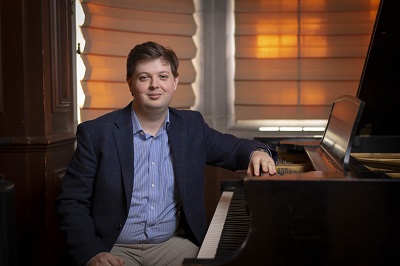Humankind has always pondered the question, “Is life sustainable on other planets?”

If music is a clue, David Ibbett, adjunct teaching professor of Arts & Sciences, can tell you the answer.
Ibbett’s first album, Octave of Light, which will be released in the fall, was sparked by this question, and tells the stories of exoplanets—planets that orbit a star outside of our solar system—through composed music. The music, which features Ibbett on piano and electronics, soprano Beth Sterling, and violinist Amelia Sie, is written to audibly illustrate molecules, such as water vapor, methane, and oxygen, found on these exoplanets. “These are some of the elements that can indicate the presence of life,” Ibbett says. “They can help us determine if a planet has the potential to support life as we know it.”
How exactly do you compose an album with exoplanets?
The short answer is by transposing color and light into sound.
In the last 10 years researchers have discovered over 4,000 exoplanets, mostly via the transit method, which shows the exoplanets as shadows as they cross the star they orbit. Each shadow has colors, or a spectrum, and the spectrum tells us which molecules are present in the exoplanet’s atmosphere—such as water or sodium. “We can’t see these colors directly,” Ibbett says. “They’re too broad in frequency range for our eyes to perceive, even if shifted to visible range. But we can turn their wavelengths into sound through sonification [the use of non-speech audio to perceive data]. We can hear more than we can see."
Although humans can see only one "octave" of color—one doubling of frequency, they can hear up to 10 octaves of sound. This means that we can hear a much wider portion of exoplanet light spectra that we could ever see with our eyes—although their frequencies need to be transposed down into audible range, he says.


